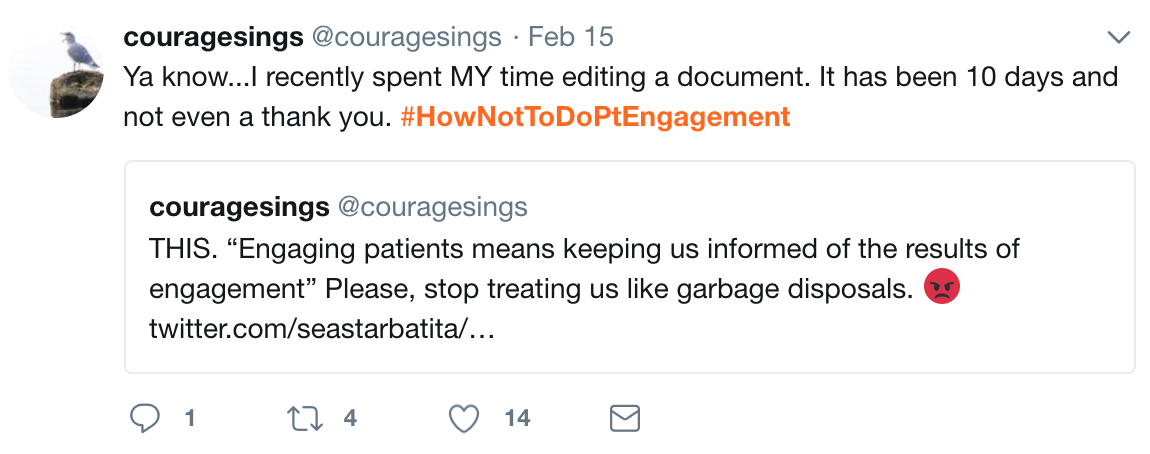
If I could forgive someone’s medical debt for each time a buzzword like patient engagement, patient experience or patient-centricity was thrown around, it would be like we had free healthcare (ahhh, the dream).
The problem with buzzwords is they are often fads, and patient engagement can’t be something that is just cool at the moment. It must endure. It shouldn’t be something you high five your buddies for “I did patient engagement, bro!” and pat yourself on the back.
Patient engagement should be a verb, not a noun.

Over the weekend, Isabel Jordan posted about a poor experience working with a hospital system. It spurred its own hashtag #HowNotToDoPtEng.
What Isabel wrote and the stories being share had a common theme: that they were not kept in the loop. And then patients were asked to do things and felt jaded for not being respected enough along the way. A position I have been in myself many times.
It got me thinking about the term “patient engagement” — and the cross-sectional nature it has. It can’t be a one and done. I started thinking about other professions that are episodic in nature, and realized that they are verbs, not nouns.
Think about other fields people work in and fill in the blank:
“I work in _______.”
Consulting. Advertising. Marketing. Engineering.
They’re action words. They endure. There are many organizations that have people devoted to working with patients, with fancy titles like Chief Patient Officer, or Director of Patient Engagement. When they tell people at a cocktail party what they do, do they say “I work in patient engaging” ;)
We must think about how to keep engagement going, despite the episodic nature of connecting with patients. Don’t leave patients hanging.
I remember being at PCORI’s first Annual Meeting and hearing patients say that they were on a research team (like, actually on the decision-making team — as PCORI promotes), yet they were never told the results of the research project they devoted their time and expertise to. Come on. It’s the least professionals and organizations can do. In a world where patients are rarely compensated for their time [but should be — I won’t go down that road in this post], the only collateral a patient may get is information. It’s important. We are all busy, but make it happen. Set calendar reminders if you have to, but don’t leave patients entirely out of the loop.
Communicating what your organization is up to with the community you are serving/plan to serve is one of the most impactful things you can do. I have been on the inside of organizations working on amazing things, but the community didn’t know, and started to get grumpy that they were forgotten and not cared for (while great initiatives were in the works). Communicate. It’s good for everyone.
How do you keep engaging (verb)?
Note to international friends: In the US, we use patient engagement in two ways: 1) on an individual level, to describe how active someone is at engaging in their own treatment plan, and 2) on a systems level, to describe the act of working with patients to co-design new solutions. In other countries this is known as public and patient involvement, patient participation, etc.
We just like to keep people guessing….
March 18, 2018
.png?width=300&height=69&name=SavvyCoop_HorizontalLogo_LargeFormat%20(1).png)